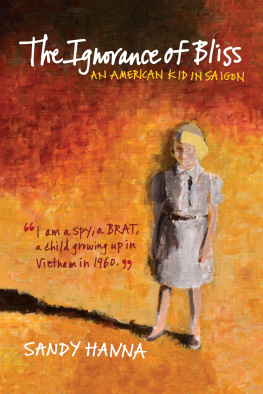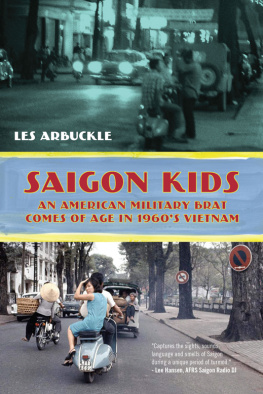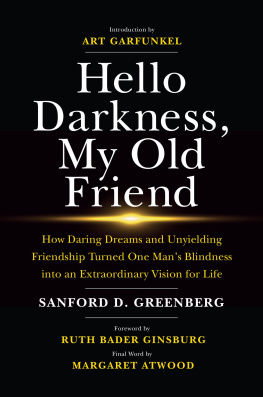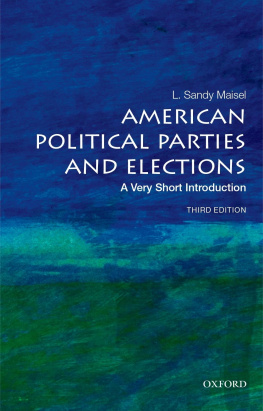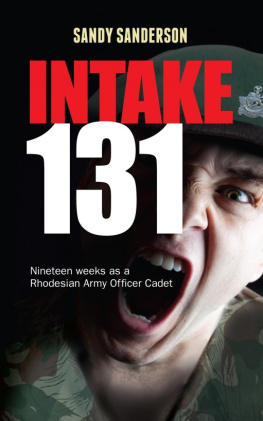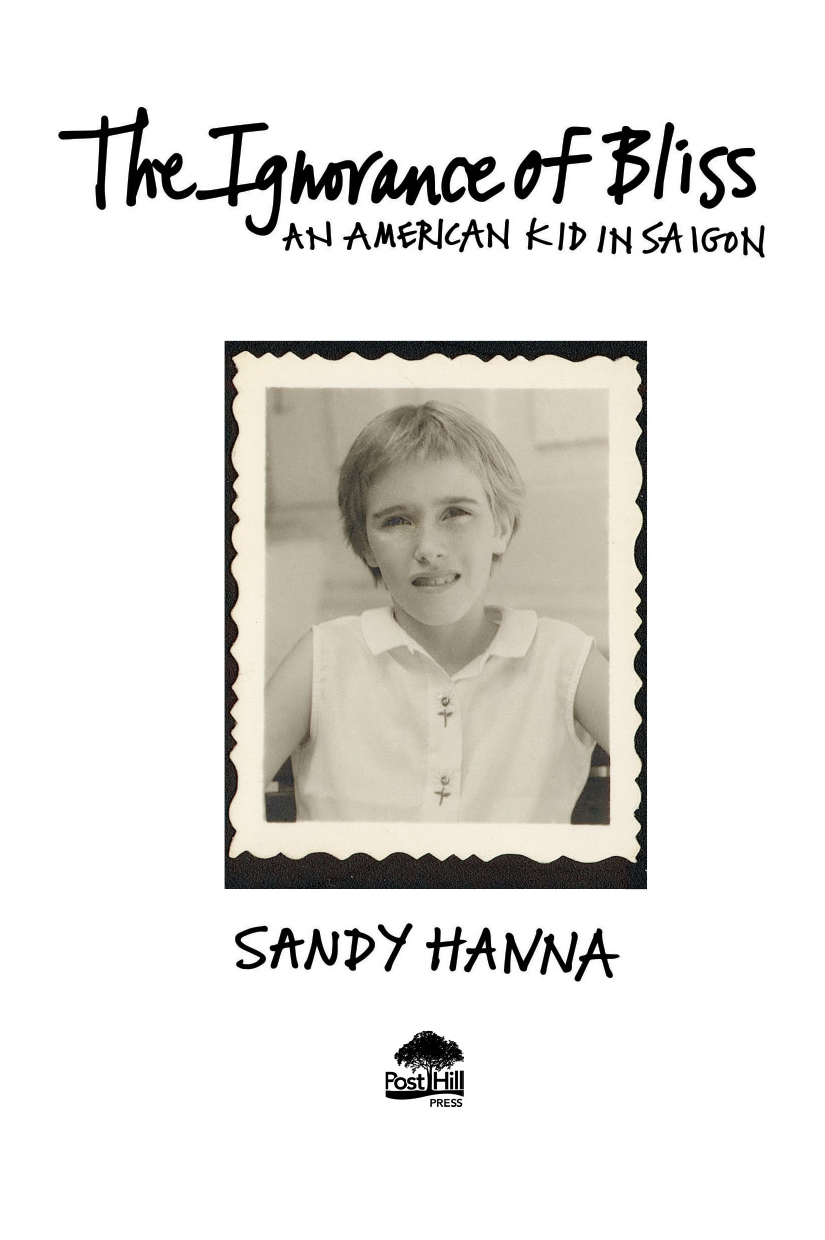
Advance Praise for The Ignorance of Bliss
Youve captured the essence of the people and the country of Vietnam at a time before all hell broke loose. You tell the story from the perspective of a child who is old enough to be aware, but whose memories come from a place of innocence. You have such a gift for nailing the descriptions of your siblings characters and motivations. It is unique on so many levels.
Lucie Haskins, Writer and Wife of a Vietnam Veteran
Powerful. Crazy. Growing up at a perfectly awkward time in life and history.
Jerry Waxler, Author, Memoir Revolution
Immersed in your wonderful book and cant put it down. Fresh, funny, tragic, and rich with unforgettable characters, this ten-year-olds vision of wartime Saigon will captivate every reader.
Arthur P. Johnson, Author and Baby Boomer

A POST HILL PRESS BOOK
ISBN: 978-1-68261-794-6
ISBN (eBook): 978-1-68261-795-3
The Ignorance of Bliss:
An American Kid in Saigon
2019 by Sandy Hanna
All Rights Reserved
Photography Courtesy of Colonel George T. Hanna
Cover Composition by Cody Corcoran
Cover Art: The Spy by Sandy Hanna
Cover Design by Alicia Milosz
Author Photo by Jeffrey Apoian
This is a work of nonfiction. All people, locations, events, and situations are portrayed to the best of the authors memory.
No part of this book may be reproduced, stored in a retrieval system, or transmitted by any means without the written permission of the author and publisher.

Post Hill Press
New York Nashville
posthillpress.com
Published in the United States of America
This book is dedicated to my parents,
Ruby Nell and Colonel George T. Hanna;
my siblings, Patijean, Robert, and George T., Jr.;
as well as to my husband, Jeffrey,
who have all played a part in my lifes journey. A special thank-you goes to my older brother for memories and details that eluded me in telling this story. For all the friends and relatives who listened to this story so many times, I thank you for your patience, suggestions, and encouragement.
Table of Contents
T he Ignorance of Bliss is the story of a time when ignorance set the course of events for a small country halfway around the world, when propaganda and paranoia created the facts upon which decisions were based and actions taken in Vietnam. This memoir is about a military family that blissfully found itself in an exotic land living a life of French decadence during a time of transition to war. The years were 1960 to 1962. This Paris of the Orient, Saigon, so aptly named by the French, was a magical place in those early years, especially for a ten-year-old child, the first-born daughter of an American military officer,
the Colonel .
The life of military-dependent children is different than that of most. It is an ever-changing life that requires the ability to adapt as their worlds change around them. These children travel to foreign lands and experience things that most cant even imagine. This story will bring you into such a life and allow you to be part of an experience that is unique. The fact that American children grew up in Vietnam is little-known. There werent that many children who went to Vietnam in those pre-war days, but those of us who were there form a tribe of our own. We call ourselves Saigon Kids and have begun to connect after so many passing years.
In Saigon, the Colonel was part of the Military Assistance Advisory Group (MAAG), serving in an advisory role as Chief of Ordnance Corps to the South Vietnamese military in the Ng nh Dim regime. This political regime had come into power with the support of the United States after violating the Geneva Accord. This was a treaty agreed upon by the Allies of World War II when the French could no longer hold on to the country. The Geneva Accord had promised a truce between 1954 and 1956, culminating in a countrywide election. It was intended to remove all foreigners from interference in Vietnam and give it the independence it so desperately sought.
A brief history of Vietnam might be helpful to understand the progression of events that occurred before and after my life in Saigon. For two thousand years, the Vietnamese had struggled to be independent of foreign rule. The French were in control of Vietnam before WWII. During WWII, the Japanese had taken over Vietnam, primarily for its ports, granting the Vietnamese independence at the end of WWII. H Ch Minh had fought alongside Americans with his Vit Minh nationalists against the Japanese. The Allies, the countries that fought together against the WWII Axis powers, agreed to return territories to the countries that had ruled them before the war. The French requested the return of Algeria and Vietnam.
The French returned to Vietnam after WWII to reclaim its former territory, only to find itself in a war with a country not wanting foreign rule. Indochina War I was fought against the French and the Japanese between 1946 and 1954. The Geneva Accord, created by Allies, after WWII established a truce with France for this war after Frances defeat at the battle of in Bin Ph. This Geneva Accord called for a cessation of hostilities and the opening of the border between South and North Vietnam at the 17th parallel from 1954 to 1956. In the interim, H Ch Minh would govern North Vietnam, and Ng nh Dim would represent Emperor Bo i in South Vietnam as premier. At the end of that two-year truce in 1956, country-wide elections were to be held to decide who would rule the entire country of Vietnam.
South Vietnam Premier Ng nh Dim held his own independent election prior to 1956. Dim knew that he would not win as a Catholic in a country that was eighty percent Buddhist, where his only political support was through the efforts of his brother Ng nh Nhu. Dim credited more people than existed in the whole of Vietnam with his win. He created the Republic of South Vietnam and declared himself president. The United States of America supported this violation of the Geneva Accord, going against the other Allies and H Ch Minh, backing Dim and a regime that would later be revealed to not be pro-American. The rest is history. Americans had no understanding of the history or the culture of this small but fiercely independent country at the time they joined the conflict. I hope to bring an awareness to a time and a place that seem to be remembered only for the wartorn bloody days of the conflict between the Americans and the Vietnamese. This is the story of an American child growing up in a country determined to gain its independence. Hopefully, this story will foster some understanding about the events that led up to that moment when all became chaos.
The Colonel, my father, asked me to tell the story you are about to read. He gave me an expos written by his military counterpart, Colonel L Vn Sm , Chief of Ordnance ARNV. It came as a direct order, something never to be disregarded. He wanted me to write something compelling, because he believed that if you dont understand history, you repeat it. He knew Americans shied away from anything having to do with Vietnam after the cessation of American involvement in the conflict, as if by ignoring it there would be no need to understand the what and why of it. He felt that Americans lack of understanding about what had led to our involvement in Vietnam has left everyone in a state of ignorance about the past, the present, and what would happen in the future. He said the mistakes that were made in Vietnam were being repeated in the Middle East and bringing disaster on all fronts. Ive attempted to make this story palatable by telling it through my eyes, those of a ten-year-old child of a military family.

